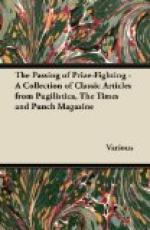“Well, yes—I’ll give you thirty.”
“Can’t play. I’m going to finish this novel, BILL.”
“Is that one of the books you write about in the papers?”
“Yes.”
“Are you going to praise it, or cut it up?”
“I’m going to give it such a—well, no, on second thoughts, I believe I’m going to praise it.” And I did.
* * * * *
LETTERS TO ABSTRACTIONS.
NO. III.—TO POMPOSITY.
MY DEAR POMPOSITY,
It was only yesterday that I dined with BULMER, the wealthy brewer, in his magnificent mansion in the neighbourhood (I dare not be more precise) of Belgrave Square. You know as well as I do that BULMER’s origin, though it may not have been humble, was certainly obscure. Nobody quite knows how he first managed to become a partner in the great concern which he now entirely controls. Fifteen years ago few people ever heard of or drank the “Pellucid Ale” without which no tap-room and few middle-class luncheon tables can now be considered complete. Suddenly, however, column upon column of the daily press overflowed, as it were, with those two magic words; analytical chemists investigated the properties of the beverage, and one and all pronounced it in highly technical language to contain more bone-forming and sinew-developing elements than any other known beer. The poetry-and-beer-loving public was fascinated by a series of memorable stanzas:—
[Illustration]
“The hardy Briton loves good cheer,
His mighty sinews never fail:
‘Pour me,’ he cries ’a
draught of Beer,
And let it be Pellucid Ale.’”
So the verse began, and it was illustrated by a flaring symbolical picture in two compartments. In the first a throng of gaunt and miserable creatures was represented crawling with difficulty towards an immense barrel, astride which sat a lusty, hop-crowned deity. In the second, every member of the same throng had become stout and hearty. The hollow cheeks were round and shining with health, the bent backs were straight, the dreary faces were wreathed in smiles, and every hand held a foam-topped glass of “Pellucid Ale.” Underneath were painted the words, “After one glass.” Even without the title, the inference was obvious; the confiding public drew it, and immense quantities of BULMER’s ale, almost simultaneously, and the result was that, in a very short time, BULMER might have rolled in money if he had felt disposed—as, to do him justice, he never did—to render himself ridiculous. Now what is there in the fact that BULMER has made a fortune in beer that should inflate him to so insufferable an extent? Can it be that there is some mysterious property in the liquid itself, some property which, having escaped even the careful investigation of the analytical chemists, has pervaded the being of BULMER, and has induced him to patronise the inhabited world? I thought so once. Indeed I have lost myself




